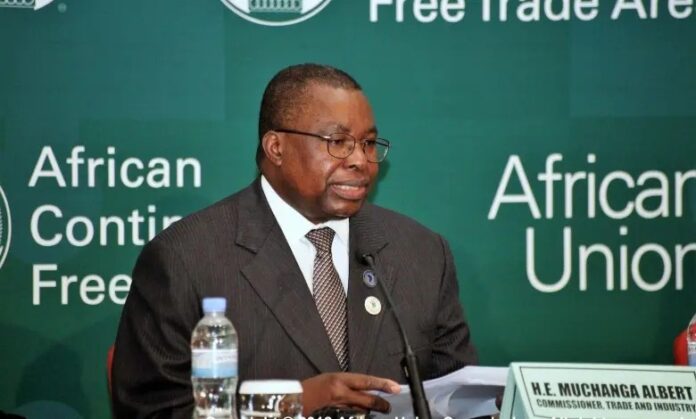The Commissioner for Economic Development Trade Tourism Industry and Minerals at the Africa Continental Free Trade Area (AfCFTA) secretariat, Albert Muchanga, has stated that President Akufo-Addo’s decision to grant executive approval for visa-free travel to Ghana by all Africans is a move in the right direction and marks a step forward to the vision of creating a single African Market under AfCFTA.
President Akufo-Addo fulfilled a promise delivered last January to international participants, mainly business executives, at the Africa Prosperity Dialogues 2024.
His promise was to allow visa-free travel to Ghana for citizens of all other African countries before his term of office will expire on January 6, 2025.
This will be a major boost for the African Union’s ongoing efforts to allow the free movement of people, goods, and services as the continent works towards implementing the world’s largest single market, involving at least 55 nation-states.

“It is most welcome. It is a move in the right direction. We have the Protocol of the Treaty Establishing the African Economic Community Relating to the Free Movement of People, Right of Residence, and Right of Establishment. The Protocol also provides for mutual recognition of professional qualifications,” Albert Muchanga told Asaase News in an exclusive interview.
“The move removes a major nontariff barrier to intra-African trade and takes a step forward in realizing the vision of creating a single African market under the African Continental Free Trade Area, which is headquartered in Accra, Ghana,” Mr Muchanga added.
President Akufo-Addo last Wednesday (18 December) gave executive approval for the implementation of the visa-free travel policy for all holders of passports issued by other African countries traveling to Ghana.
Following executive approval, the Ministry of Foreign Affairs and Regional Integration and the Ministry of the Interior have initiated processes for executing the policy.
What is outstanding is for the Ghana Immigration Service to announce a definite date for the visa-free policy to take effect. The start date is anticipated to be Wednesday, 1 January 2025.
With this approval and implementation of a visa-free travel policy for all African passport holders to Ghana, the West African nation will become the fifth country on the continent to institute such a policy. Currently, Rwanda, Seychelles, The Gambia, and Benin are the only African countries that provide visa-free entry for all African citizens.

The Nigerian industrialist and the richest African, Aliko Dangote, has spoken about the frustration of travelling across the continent.
“As an investor, as someone who wants to make Africa great, I have to apply for 35 different visas,” Dangote said at a business forum in Rwanda earlier this year.
“I really don’t have the time to go and drop off my passport in embassies to get a visa,” he added.
Ghana is the host nation for the African Continental Free Trade Area Secretariat. Ghana’s first independent leader, Dr Kwame Nkrumah, was at the forefront of the campaign to unite Africa into a single borderless nation.
Ethiopia, where the African Union headquarters is, has been criticised for its restrictive immigration policy for Africans travelling into the country.
Writing in the Financial Times on 18 December, Aanu Adeoye stated, “Behind closed doors, I have heard many more stories from African businesspeople unable to attend events in neighbouring countries as a result of red tape. The head of a development lender, for example, had difficulty getting hold of a visa to a southern African country despite receiving an invitation from that country’s president.
“To make matters more bizarre, European and US citizens can often travel across the continent more freely than African nationals. There is a booming trade in wealthy Africans seeking second citizenship partly to solve this problem. Citizenship and residency firm Henley & Partners have opened up shop on the continent to take advantage of the situation.”
Adeoye argues, “Simplifying travel is important if the continent is serious about building deeper internal trade and cultural ties.”
The Nigerian journalist and Weet African correspondent for the FT points out that after nearly seven decades of independence across much of the continent, modern-day leaders have little excuse for sticking with the status quo.
“Globalisation and the free movement of people may be unfashionable elsewhere but it is essential for Africa’s growth. Regional blocs in east, west, and southern Africa already have the structures in place to make visa-free travel a reality. The continent must now expand and implement those plans if it is to open up to itself,” he argues.
Source: Asaaseradio


